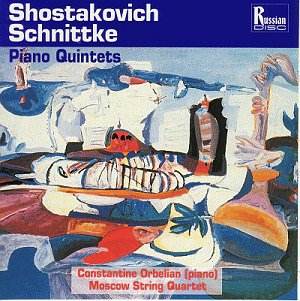These two pieces make such excellent bedfellows that
I’m surprised the coupling is not more common, though as I write this,
Naxos have just announced their own recording of the same pairing. The
Shostakovich seems to me an unfairly neglected work, considering its
instant popularity after the 1940 premiere (the composer with the Beethoven
Quartet). It was written in the wake of the Sixth Symphony, and is his
last major pre-war piece. It encompasses many of the traits for which
the composer is famous; there are the intense, neo-Bachian first and
second movements, a playful, heavily ironic scherzo, a pensive, soulful
intermezzo, and a finale where probing questions lurk beneath a surface
veneer of jovial high spirits.
The artists on this disc seem to understand most of
these characteristics, and that elusive balance between seriousness
and parody is well caught. The slowly unfolding fugal second movement
is particularly impressive, and I like their lightness of touch in the
deliciously witty scherzo, where sarcasm and a clumsy, almost brutal
rusticity go hand in hand. The piano playing throughout is impressive,
and some occasional sour intonation from the string players is hardly
off-putting – indeed, one can argue that the sheer rawness of some of
this music is far better conveyed here than with an immaculate, plushly
virtuosic reading.
The Schnittke also receives an excellent performance,
and is, in many ways, a finer work than the Shostakovich. The older
composer was clearly an influence, but the real inspiration was the
death of Schnittke’s mother, and this produced a directness of utterance
that is truly memorable. It is certainly true of Schnittke (and other
composers) that some of his best work is in the chamber medium, and
this quintet is acknowledged as a key piece. The almost child-like naivety
of the opening immediately captures the attention, and this theme is
explored with astonishing skill and variety of texture from such modest
forces. Schnittke constantly teases the ear with his inventive sonorities;
try 3.17 into the pensive andante, where eerie string clusters form
a backdrop to a simple piano unison, hypnotically repeated. One can
sense the torment and anguish that is finding a musical voice here,
and when the tortured sounds finally give way to a finale of almost
unbelievable simplicity, one feels a calm resignation, a letting go,
that is deeply moving. This is a magnificent work, and this performance
certainly does it justice. I can imagine quartet playing of greater
variety and depth of tone, but there is a real Russian ‘edge’ that has
its own rewards, and the playing of Constantine Orbelian is little short
of inspired.
The recording is obviously coming to us from a large
empty space, but with fairly close microphone placing, no intimacy is
lost, and the balance between instruments is good. Notes are reasonable,
though there are typos and wrong timings. But all in all, this is a
release well worth investigating.
Tony Haywood


